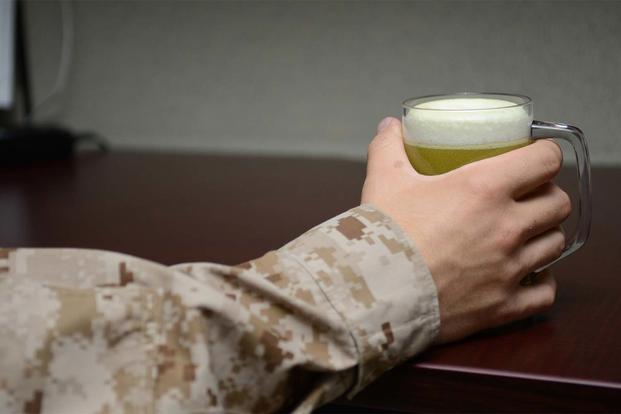A third of troops reported binge drinking in a newly released health study, prompting researchers to urge military leadership to give immediate attention to the problem.
Members of the sea services were the most likely to report binge or hazardous drinking, according to data released by Rand as part of the Defense Department's health-related behaviors study.
The Marine Corps had the highest reported rate, with 42.6 percent of respondents saying they engaged in binge drinking within the past 30 days. The Navy was next, with 34.2 percent of sailors reporting binge drinking. More than 31 percent of Coast Guard respondents also said they'd binged.
Binge drinking means consuming five or more drinks on one occasion for men and four or more drinks for women at least once in the past month, according to the report. The data was collected in 2015. Military Times first reported on the survey findings this week.
"We found that rates of binge drinking in the services remained nearly as high as in 2011 and were at a level high enough to cause concern," researchers wrote.
Respondents from those services also reported the highest rates of hazardous or disordered drinking, which according to the report "meets criteria for a possible alcohol use disorder." Nearly half of Marine respondents, about 40 percent of sailors and 34 percent of Coast Guard respondents fell into that category.
That type of drinking can result in serious consequences, loss of productivity and risky behavior, according to the report.
The sea services have taken steps in recent years to combat alcohol abuse in the ranks.
Navy leaders promote the responsible use of alcohol and healthy alternatives to drinking throughout a sailor's career -- from recruitment to retirement, said Lt. Rick Moore, a spokesman for the chief of naval personnel.
"Navy leadership at all levels regularly engages with sailors, especially before long weekends and holiday periods, to discuss the importance of responsible drinking and the necessity for sailors to have a plan in place -- like having a designated driver -- if they are going to be drinking," Moore said.
Coast Guard leaders also work to educate members about alcohol abuse and prevention throughout their careers, said Lisa Novak, a service spokeswoman. The Coast Guard follows the guidelines of the National Institute on Alcohol Abuse and Alcoholism, she said.
"The Coast Guard also provides consistent messaging about the services and support available to personnel who believe they need help dealing with alcohol-related issues," Novak said. "...It should be noted the survey also indicates that the majority of Coast Guard personnel do not have an issue with binge-drinking."
The Marine Corps' Training and Education Command did not immediately respond to questions about how it addresses alcohol abuse prevention. Commandant Gen. Robert Neller said in a service-wide message released last year that Marines "need to drink less, read more, and [train] smarter."
"We're known for our toughness and endurance, but many of us eat poorly, smoke, dip, and drink alcohol excessively," he said. "This self-abuse plays into the hands of our enemies. … Take a hard look at how you are living your life. Be honest. Are you taking care of your mind, body and spirit?"
Neller also introduced the "Protect What You've Earned Campaign," which is similar to a new program the Navy started called "Keep What You've Earned."
That program, Moore said, encourages responsible drinking through positive messaging about what sailors have achieved in their Navy careers. The Navy also unveiled a new mobile application geared toward junior sailors called "Pier Pressure." The app encourages sailors to practice responsible drinking behaviors in real life through a role-playing game and includes a blood-alcohol content calculator and local taxi-cab search.
The Rand-DoD health report states that 68.2 percent of service members perceived the military culture as "supportive of drinking." Researchers found that alcohol is often purchased on base, and suggested raising prices.
Commissary officials recently announced that they will soon begin selling beer and wine on base.
Ultimately, Novak said studies like the health-related behaviors survey are useful sources of information so military leadership can provide the best education and resources to the force.
-- Gina Harkins can be reached at gina.harkins@military.com. Follow her on Twitter at @ginaaharkins.











